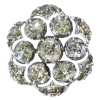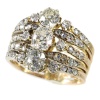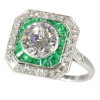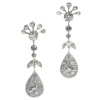Nous offrons des facilités de paiement pour le bijou de vos rêves. Demandez nous les détails. Expédition assuré gratuite !
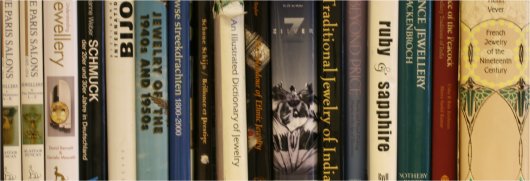
Antique jewelry glossary
Welcome to our extensive antique jewelry glossary with around 1,500 jewelry related entries.If you feel you are missing an explanation, feel free to let us know and we will add it.
A - B - C - D - E - F - G - H - I - J - K - L - M - N - O - P - Q - R - S - T - U - V - W - X - Y - Z all
Synthetic diamond
A synthetic gemstone that resembles the natural diamond, produced at very high temperature and under great pressure. The earliest experiments were made before 1880 by a Glasgow chemist, J.B. Hannay, who produced some small stones of doubtful authenticity. Experiments by F.F.H. Moissan in the 1890s and by others later proved inconclusive. In 1955 a successful process was developed using techniques devised by Dr Percy W. Bridgman (1882-1961) for the General Electric Co. in the United States, producing by high temperature and enormous pressure some very small stones (1,2mm in length). As a result, this firm and others in Sweden and elsewhere now produce quantities of small synthetic diamonds for industrial use, but they are not large enough for gemstones and are more costly than natural stones.
By 1970 General Electric Co. had produced gem-quality synthetic diamonds that were colourless or that showed yellow or blue, but they show technical deviations from the natural stones and under a microscope have a 'dusty' internal look. Some man-made stones are sold as simulants of diamonds but are not synthetic diamonds, e.g. cubic zirconia; yttrium-aluminium-garnet, and strontium titanate.
From: An Illustrated Dictionary of Jewelry, autor: Harold Newman, publishers: Thames and Hudson



